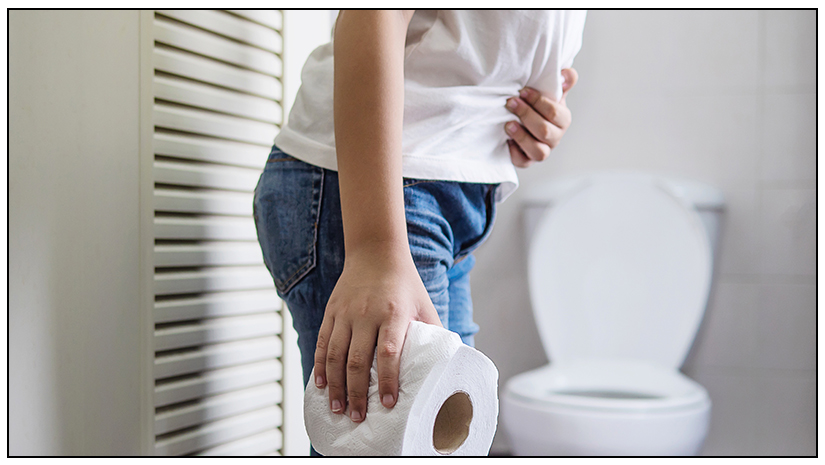Frequent Bowel Movements
OVERVIEW | CAUSES | Care and Treatment | Home remedies | when to call a doctor | REFERENCES

OVERVIEW
Frequent bowel movements is a condition in which a person defecates (eliminates waste from the bowel) more often than usual. There is no “normal” number of bowel movements. Many healthcare providers agree that healthy bowel movement frequency can range from three times a day to three times a week. However, your 'normal' pattern may be different from these numbers. To say that a person’s bowel movements have become more frequent is based on an increase in that person’s usual pattern, not on a standard definition that applies to everyone.
The two main bowel movement conditions are constipation (fewer than three bowel movements per week) and diarrhea (more than three movements of loose stools per day).
CAUSES
Some cases of frequent bowel movements last for a short time only and are not a cause for concern. These can be caused by digestive upset from eating spoiled, fatty or spicy food, a food that is not tolerated, or an intestinal “bug” that clears in a day or two.
Other possible causes of frequent bowel movements include an increase in physical exercise, certain medications like antibiotics or metformin, or a change in the diet (more fiber, water, fats or sugars). Bowel movements may return to the usual after the person adapts to these changes or makes modifications to his or her diet.
When the person has other symptoms to go along with the greater number of bowel movements, there may be other causes, including the following:
- Bacterial infection
- C. difficile infection (which can be serious if untreated)
- Viral infection
- Parasitic infection, such as from worms or protozoa
- Diverticulitis (the small pockets along the wall of the colon fill with stagnant fecal material and become inflamed)
- Inflammatory bowel disease (a group of disorders, including Crohn’s disease and ulcerative colitis, that cause irritation and swelling of the digestive tract)
- Pancreatitis (inflammation of the pancreas)
- Celiac disease (an autoimmune disease that causes sensitivity to gluten, a protein found in grains such as wheat, rye or barley)
- Cancer of the colon or elsewhere in the digestive tract
- Food allergies
- Gallbladder problems
- Lactose intolerance (the inability to digest lactose, the sugar primarily found in milk and dairy products)
- Irritable bowel syndrome (a disorder of the colon or lower bowel with symptoms that include abdominal pains or cramps)
- Side effects of medications (including antacids, laxatives, stool softeners)
- Foods and beverages, including certain herbs and herbal teas, alcohol and caffeine
- Use of antibiotics, which can upset normal bacteria in the gut
- Bowel obstruction
- Complications of intestinal or abdominal surgery
- Complications of cancer treatments such as chemotherapy or radiation therapy
Care and Treatment
Experts recommend seeing a doctor if diarrhea lasts more than 2 days.
Frequent solid bowel movements do not present the same risk of dehydration as diarrhea. However, a person who is frequently passing solid stools should see a doctor if they:
- Develop a fever
- Notice blood in their stool
- Start vomiting or feeling nauseated
- Experience painful stomach cramps
- Cannot control their bowel movements
The doctor may ask you the following:
- The time of your last bowel movement
- How often you urinate
- The consistency of stool (watery or shaped)
- If there is blood around or in the stool
- If you have bleeding from the rectum
- If you are dizzy or have cramps, pain, fever or nausea
- What foods and drinks you consume
- If you have had any recent changes in your weight
- The medications you take
- If and when you have traveled recently
The doctor may conduct a physical examination and may order blood and stool tests, urinalysis and X-rays.
Depending upon the diagnosis, the course of treatment is determined.
Home Remedies
Mild cases of diarrhea can be treated with an over-the-counter medicine available as liquids or tablets. Follow the instructions on the package.
Note: do not take antidiarrheal medicines if a bacterial infection or parasites are the suspected cause (symptoms include fever or bloody stools). It is important to allow bacteria or parasites to pass through the digestive system.
When to call a doctor
Contact your doctor if you have frequent bowel movements and any of the following symptoms:
- Bloody stools or bleeding from the rectum
- Very bad-smelling stools
- Unintended weight loss
- Severe or chronic (long-term) diarrhea
- Acute severe diarrhea after hospitalization or after taking antibiotics
- Painful, swollen or bloated abdomen
- Abdominal cramps
- Painful bowel movements
- Incontinence (an inability to control bowel movements)
- Urgent need to have a bowel movement
- Nausea
- Vomiting
- Body aches
- Fever
- Chills





































































































